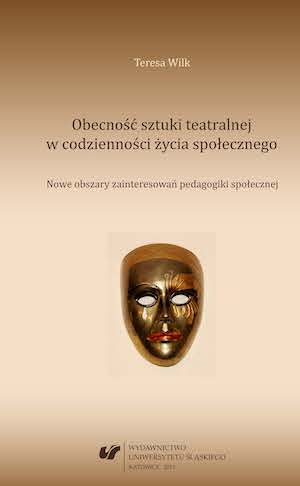Obecność sztuki teatralnej w codzienności życia społecznego. Nowe obszary zainteresowań pedagogiki społecznej
The Presence of Theatre Art in Everyday Social Life. New Areas of Interest for Social Pedagogy
Author(s): Teresa Wilk
Subject(s): Social Sciences, Pedagogy
Published by: Wydawnictwo Uniwersytetu Śląskiego
Keywords: Theatre Art; Social Pedagogy
Summary/Abstract: The book shows the presence and engagement of theatre art in everydaysocial life. In order to display the constant presence of theatreand theatrical activities in everyday perspective, it presents – broadly –the constitution of theatre art, both in international space and inPoland. The orientation towards a widespread presence and availability oftheatre in every historical period became the incentive towards presentingits role in social practices in the context of social pedagogy. It is anattempt to present the possibilities of employing art in the area of pedagogicaltasks.Presenting the beginnings, the institutionalization and the developmentof theatre in different geographical regions in a historical perspectivesought to illustrate the constant presence of theatrical activities in thehistory of mankind.Based on source materials, it was purposeful to show that this artform developed from the specific needs of past generations as a form ofexpression, manifesting feelings, a method of communication, and a formof fulfilling the needs of recreation and leisure. With time, theatre fulfilledincreasingly larger social, educational, and emotional-aesthetic roles. Whileperforming those functions, it became an important instrument in socialpractices: processes of education and upbringing of the younger generations,shaping and experiencing reality, and finally – nurturing moral attitudesand values.It is worth remembering that from the very beginning, theatricalauthors and creators referenced everyday human existence in their texts,utilizing both positive attitudes, experiences and situations, as well as negative,problematic phenomena, which demonstrated frailties and flaws ofthe human nature.Modern dramatic arts substantiate that this topical inclination has notdrastically changed throughout the ages; only forms of presentation andmeans of expression have altered.The work particularly spotlights social-theatrical activities at this timeof transformation, and most of all – a time of numerous social conflicts,shortages, and existential and emotional problems. The specificity of theatre– of theatre art – and its permanent curiosity of the surroundingsocial reality caused the reciprocity (intermingling) of theatre and societyto become the norm. This in turn has and still does imply a range of tasksand functions theatre can and admittedly does serve for the society andwithin its boundaries.This current of activities includes classical, alternative, and amateurtroupes, showing that theater (even in its classical form) does not lose itsideas, formulas, and artistry, engaging itself in creating positive images, aswell as “correcting”/accentuating negative phenomena in everyday socialspace through its works, subject matter, form, and presentation venues.Thus, theatre art, as well as quasi-theatrical activities become a form ofprophylaxis and compensation, a basic task of social pedagogy.In summary, the contents of this work indicates that through established,basic artistic functions, but also social and educational ones, theatrecan and does become a partner for activities of social pedagogy.
- E-ISBN-13: 978-83-8012-369-4
- Print-ISBN-13: 978-83-8012-368-7
- Page Count: 280
- Publication Year: 2015
- Language: Polish
- eBook-PDF
- Table of Content
- Introduction

